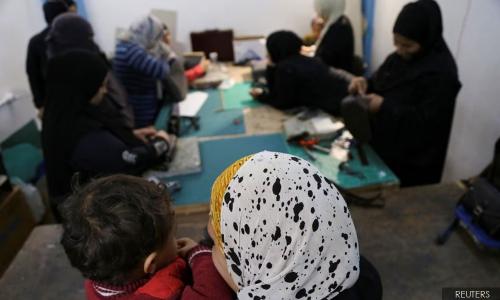Egypt's female 'prisoners of poverty' struggle with stigma
Egyptian women facing jail for falling into debt face social stigma and, if they have been freed from prison, struggle to rebuild their lives, NGO workers say, despite support from civil society groups and some state help in securing early releases.
The issue has gained attention recently because of a move by President Abdal Fattah al-Sisi in March to grant pardons to male and female debtors, after which the Interior Ministry said 85 prisoners were freed.
Since early last year, Egypt has also been hit by an economic crisis that saw official annual inflation rates soar to more than 30 percent and eroded living standards for many people.
As many as 60 percent of the population of 104 million is estimated to be below or close to the poverty line.
Egypt does not give statistics on its prison population but campaigners say poor women, many of whom are divorced or suffering from medical conditions that are expensive to treat, are especially vulnerable to money problems.
One woman with three children, who asked to remain anonymous because of the risk of social stigma, said she fell into debt four years ago after buying household appliances on credit and at a high rate of interest for the marriage costs of her orphaned niece.
When she was unable to pay 30,000 Egyptian pounds (RM7,600 at the time) as well as 16,000 pounds in interest, the creditor reported her to the police.
She was sentenced to prison in absentia but while hiding from the police she reached out to the Children of Female Prisoners Association, an NGO, and they helped pay her debt.
“I was terrified. Until now, I can’t sleep… when the police knock on your door and take you, it’s like a death sentence,” she said.
“I have daughters and when you’re arrested people don’t know what you did, they gossip,” said the woman, who also required treatment for cancer and worked selling grilled corn on the street in Giza, across the Nile from Cairo.
Indebted persons face jail
Most women who are released from prison, after serving time on debt charges, struggle to find jobs or to continue living in their old neighbourhoods, said Lamia Magdy, director of the Phoenix Project at the Children of Female Prisoners Association.
Illness and severe poverty were the main reasons for people falling into debt, said Soheir Awad, an advisor to Al-Masry Foundation, another NGO.
Awad said as many as 100,000 cases of indebted men and women facing legal risk or jail under a number of laws had crossed her desk during 13 years on the “prisoners of poverty” file.
The Social Solidarity Ministry has worked with the foundation to pay off the debts of some prisoners and secure their release.
The presidential pardons were a “ray of light”, said Awad, but not enough.
“Every day we have people going in and out of prison, as long as they don’t have jobs but still have wants and needs, there will always be those in debt,” she said.
- Reuters
RM12.50 / month
- Unlimited access to award-winning journalism
- Comment and share your opinions on all our articles
- Gift interesting stories to your friends
- Tax deductable

